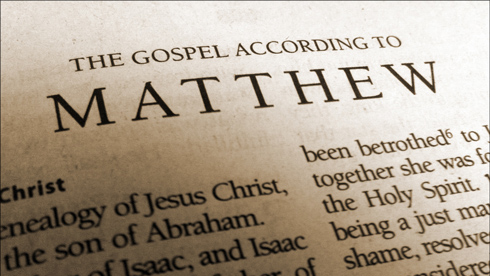By: Brian Chilton | June 6, 2017
Over the course of the new few weeks, we will discuss the reasons for accepting the traditional viewpoints for New Testament authorship. We will begin with the Gospel of Matthew today and will then move towards the other three Gospels before looking at some of the letters in Revelation.
The New Testament begins with the Gospel of Matthew. But, what do we know about the origin of the First Gospel? In a world where traditional scholarship is often questioned and too often disregarded, several theories exist as to whom the author of the First Gospel may be. Traditionally, the church has ascribed the First Gospel to the apostle known as Matthew. But, what evidence do we find about the author of the first book in the New Testament?
Internal Evidence
When we discuss internal evidence, we are speaking of the evidence that we find within the book in question. What clues do we find about the author of the First Gospel from the text? Like the other three Gospels, the First Gospel is anonymous.
First, we find that the author of the First Gospel is thoroughly entrenched in Judaism. The author often quotes the Hebrew Bible (otherwise known as the Old Testament). He parallels the life of Jesus with the great prophets of Judaism. Additionally, he makes every effort to show that Jesus is the fulfillment of messianic prophecy. In many ways, the author of the First Gospel focuses on the Jewish aspects of the faith, even describing some areas such as Jesus’s exclusion clause for divorce. The writer of the First Gospel also focuses quite a bit more on Jesus’s messages than do some of the other Gospel writers.
Second, the author focuses on Jesus’s work within Galilee and does not so much focus on Jesus’s work with Gentiles as does Luke. Thus, the evangelist is mostly concerned with Jesus’s ministry to the Jews.
Finally, the author of the First Gospel adds financial details only found in the First Gospel. For instance, only the First Gospel records the incidence where those who collected the temple tax “approached Peter and said, “Doesn’t your teacher pay the temple tax” (Matthew 17:24)?[1]
From all the details considered with the internal evidence (one who is thoroughly Jewish in scope of the messages presented by Jesus, one who focuses on the prophetic fulfillment of Jesus, one who focuses on the ministry of Jesus to Jews, and one who focuses on financial matters especially in the area of taxes), Matthew best fits as the author of the First Gospel. Matthew was a tax collector before accepting Jesus as Savior and his role as an apostle. Thus, Matthew’s knowledge of shorthand to take notes as well as finances would far excel most others.
External Evidence
When we speak of external evidence, we are addressing information we have about a document’s authorship from outside the document. What do others say about the author of the First Gospel?
The early church is unanimous in their acceptance of Matthew as the writer of the First Gospel. Papias, Irenaeus, Pantaenus, and Origen all report Matthew as the writer of the First Gospel. Papias (c. AD 60-130) writes, “Matthew put together the oracles [of the Lord] in the Hebrew language, and each one interpreted them as best he could.”[2] While we do not have a Hebrew or Aramaic edition of Matthew’s Gospel, there are reports that one may have existed in the early church.[3] Regardless, one should not be surprised that Matthew, who would need to have great knowledge of Greek in the business world, originally wrote his Gospel in Hebrew or Aramaic, only to revise the Gospel in Greek. Even if his Gospel were written in Greek by another, even say an amanuensis,[4] this would not negate Matthew’s authorship. Craig Evans recently recorded a video where he claims that Matthew may have come about in phases.[5]
Pantaenus also confirmed that Matthew was the author of the First Gospel. The great church historian, Eusebius of Caesarea, writes that Pantaenus, a church leader in the late 2nd to possibly early 3rd century, came across the Hebrew version of Matthew’s Gospel. Eusebius notes that Pantaenus was “a man highly distinguished for his learning, had charge of the school of the faithful in Alexandria.”[6] The following is Eusebius’s report of Pantaenus’s encounter with the Hebrew edition of Matthew’s Gospel:
“It is reported that among persons there who knew of Christ, he found the Gospel according to Matthew, which had anticipated his own arrival. For Bartholomew, one of the apostles, had preached to them, and left with them the writing of Matthew in the Hebrew language,6 which they had preserved till that time.”[7]
With the addition of Origen and Irenaeus’s acceptance of Matthew writing the First Gospel, one is hard-pressed to dismiss their claims.
In addition, scholars acknowledge that Matthew’s name was associated with the First Gospel from the earliest times. The writers of the CSB Study Bible denote that “the title that ascribes this Gospel to Matthew appears in the earliest manuscripts and is possibly original. Titles became necessary to distinguish one Gospel from another when the four Gospels began to circulate as a single collection.”[8]
Date and Location of Writing
It is certainly reasonable to accept that Matthew was written in the 50s due to the reasonable assumption that Acts was finished before AD 64, with Luke coming before Acts, and Matthew writing his Gospel before Luke’s. Scholars generally hold that Matthew composed his Gospel in or around Antioch of Syria.
Conclusion
Some may argue that a disciple like Matthew would not borrow material from Mark, if in fact it is true that Matthew did borrow material from Mark’s Gospel. However, when one considers that Matthew followed Jesus long after most of the apostles, and that Matthew was not an inner-circle disciple, then it stands to reason that Matthew would borrow material from Mark’s Gospel if it is true that Mark relayed information from Simon Peter—who was both an early apostle and inner-circle disciple.
While some will still disagree, it seems strange to me to ascribe the First Gospel to Matthew of all people, especially when the First Gospel was used as a church manual in many cases. Matthew was a tax-collector. Tax-collectors were held in slightly higher esteem than pond scum…but not by much. So, why ascribe the First Gospel to a tax-collector unless there was at least some merit to the claim?
In my humble opinion, I believe the First Gospel came to us in three phases. First, the apostle Matthew wrote the teachings of Jesus in Aramaic. Then, Matthew added the miracles and deeds of Jesus to his Aramaic and/or Hebrew edition of his Gospel adding his eyewitness testimony and the testimony of Simon Peter as found in Mark’s Gospel. Finally, either Matthew himself or a highly trained scribe translated the Gospel in Greek.
Notes
[1] Unless otherwise noted, all quoted Scripture comes from the Christian Standard Bible (Nashville: Holman, 2017).
[2] Papias, “Fragments of Papias,” in The Apostolic Fathers with Justin Martyr and Irenaeus, ed. Alexander Roberts, James Donaldson, and A. Cleveland Coxe, vol. 1, The Ante-Nicene Fathers (Buffalo, NY: Christian Literature Company, 1885), 155.
[3] I believe it is Jerome who reports seeing a Hebraic Gospel of Matthew. But is this the same? We cannot know for sure.
[4] That is, a scribe who writes down the words that are dictated to oneself. Some amanuenses were given freedom to add their own expressions to a degree.
[5] Video recorded for Faith Life. I could not find the link. I will post the link if I am able to find it.
[6] Eusebius of Caesaria, “The Church History of Eusebius,” in Eusebius: Church History, Life of Constantine the Great, and Oration in Praise of Constantine, ed. Philip Schaff and Henry Wace, trans. Arthur Cushman McGiffert, vol. 1, A Select Library of the Nicene and Post-Nicene Fathers of the Christian Church, Second Series (New York: Christian Literature Company, 1890), 224.
[7] Eusebius of Caesaria, “The Church History of Eusebius,” in Eusebius: Church History, Life of Constantine the Great, and Oration in Praise of Constantine, ed. Philip Schaff and Henry Wace, trans. Arthur Cushman McGiffert, vol. 1, A Select Library of the Nicene and Post-Nicene Fathers of the Christian Church, Second Series (New York: Christian Literature Company, 1890), 225.
[8] “Introduction to Matthew,” CSB Study Bible (Nashville: Holman, 2017), 1494.
About the Author:
 Brian Chilton is the founder of BellatorChristi.com and is the host of The Bellator Christi Podcast. He received his Master of Divinity in Theology from Liberty University (with high distinction); his Bachelor of Science in Religious Studies and Philosophy from Gardner-Webb University (with honors); and received certification in Christian Apologetics from Biola University. He hopes to enter doctoral studies soon in the realm of theology and/or biblical studies. Brian is full member of the International Society of Christian Apologetics and the Christian Apologetics Alliance. Brian has been in the ministry for over 14 years and serves as the pastor of Huntsville Baptist Church in Yadkinville, North Carolina.
Brian Chilton is the founder of BellatorChristi.com and is the host of The Bellator Christi Podcast. He received his Master of Divinity in Theology from Liberty University (with high distinction); his Bachelor of Science in Religious Studies and Philosophy from Gardner-Webb University (with honors); and received certification in Christian Apologetics from Biola University. He hopes to enter doctoral studies soon in the realm of theology and/or biblical studies. Brian is full member of the International Society of Christian Apologetics and the Christian Apologetics Alliance. Brian has been in the ministry for over 14 years and serves as the pastor of Huntsville Baptist Church in Yadkinville, North Carolina.
(c) 2017. BellatorChristi.com.






[…] Finalmente, o autor do Primeiro Evangelho acrescenta detalhes financeiros encontrados apenas no Primeiro Evangelho. Por exemplo, apenas o Primeiro Evangelho registra a incidência em que aqueles que cobravam o imposto do templo “aproximaram-se de Pedro e disseram: “Seu mestre não paga o imposto do templo” (Mateus 17:24)? [1] […]
[…] June 7, 2017 […]
[…] the oracles [of the Lord] in the Hebrew language, and each one interpreted them as best he could.”[2] While we do not have a Hebrew or Aramaic edition of Matthew’s Gospel, there are reports that […]
[…] Finally, the author of the First Gospel adds financial details only found in the First Gospel. For instance, only the First Gospel records the incidence where those who collected the temple tax “approached Peter and said, “Doesn’t your teacher pay the temple tax” (Matthew 17:24)?[1] […]